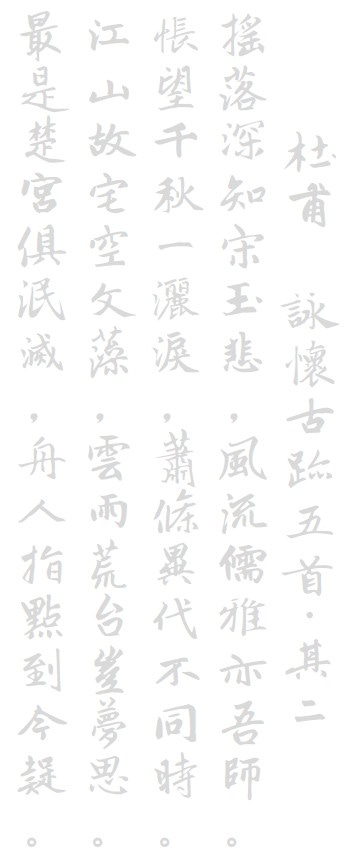Five Songs Inspired by Historic Sites (2) Du Fu I’m adrift like a leaf on the cold autumn wind, So the misery Song Yu experienced then Is quite clear to me now. His intelligence, knowledge, And style are a model for me, and his pain, A millennium later, still moves me to tears. We’re two generations connected by suffering, Kept separate only by time. His old villa holds nothing but vacated verse. Did he dream new mythologies out of thin air? A goddess who used clouds and the rain for her trysts With a king — was she cut from whole cloth? What of him? All the palaces he must have lived in are gone, The cities of Chu so completely erased That even the boatmen who criss-cross these waters Can’t point to their ruins with certainty.
Song Yu: A poet who lived in Chu (around the Yangtze river) in the 3rd century BCE.
Goddess: In Song Yu’s most famous poem, the Gaotang Rhapsody, he tells the story of a goddess who appeared to a king in a dream. They made love, and as she left, she told the king that she was the morning clouds and evening rain. “Clouds and rain” passed into the language as a metaphor and euphemism for sex.
In this series of poems, Du Fu transcends and subverts his genre. Faced with an ancient site, the conventional attitude to take is praise for the past, and worried comparisons with the present. Du Fu gestures in this direction, but his mood is much more mixed. A thoughtful, discursive tone fills this series of five poems. They feel like works in progress, without any of the certainty that Du was able to bring to earlier work, before the war. In this poem he wants to connect to an ancient writer, Song Yu, but is unsure how to do so when he does not understand Song’s creative process. Du is left uncertain even of the history of the period when Song was alive.
杜甫 咏怀古迹·其二
摇落深知宋玉悲,风流儒雅亦吾师。
怅望千秋一洒泪,萧条异代不同时。
江山故宅空文藻,云雨荒台岂梦思。
最是楚宫俱泯灭,舟人指点到今疑。



